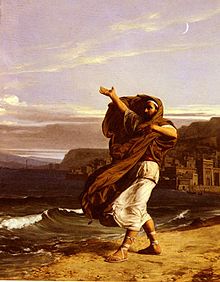
Word of the Day: Philippic
Today’s word of the day, thanks to the website www.dictionary.com, is philippic, a noun or adjective meaning “any speech or discourse of bitter denunciation.” The website goes on the explain,
The adjective and noun philippic come from Latin Philippicus “of or pertaining to King Philip II of Macedon” (the father of Alexander the Great), from Greek Philippikós with the same meaning. Philippikós is usually used in the plural, Philippikói, with the plural noun lógoi “speeches” understood. The original Philippikói lógoi were three speeches delivered by the Athenian statesman Demosthenes against King Philip of Macedon between 351 and 341 b.c. The second set of philippics were the 14 orations that the Roman statesman and man of letters Marcus Tullius Cicero delivered against Mark Antony between 44 and 43 b.c. Cicero himself called these speeches (ōrātiōnēs) Philippicae “Philippic (orations).” The speeches not unnaturally enraged Mark Antony, who ensured that Cicero’s name stood at the head of the list of proscriptions. The adjective sense of philippic entered English in the mid-16th century.
The website www.etymonline.com says that the word entered English in the “1590s, ‘bitter invective discourse,’ from Middle French philippique, from Latin (orationes) Philippicæ, translation of Greek Philippikoi (logoi), the speeches made in Athens by Demosthenes in 351-341 B.C.E. urging Greeks to unite and fight the rising power of Philip II of Macedon. The Latin phrase was used of the speeches made by Cicero against Marc Antony in 44 and 43 B.C.E.”
So who was this Demosthenes? Born in 384 B.C.E. in Athens, Demosthenes became an orphan at age 7. But his father, who was a maker of swords, let him quite an estate. However, he also left him three guardians who did not do a very good job of maintaining Demosthenes’s estate. So even before he came of age, Demosthenes began to prepare himself to fight his guardians for the remainder of his father’s estate. We learn about Demosthenes in part from Parallel Lives by Plutarch. Plutarch tells us that Demosthenes had a speech impediment, a stammering, so he practiced speaking with pebbles in his mouth to improve his articulation and by speaking while running. He practiced in front of a mirror. Perhaps most famously, he went down to the beach to practice speaking against the sound of the ocean.
At 20, he sued his guardians and won the remainder of his father’s estate, though it was a mere fraction of what his father had originally left him.
He then began a legal career, writing speeches for use by others in legal cases (logographer) and as an advocate for others. Although logographers often remained anonymous, Demosthenes became interested in politics and began making speeches against individuals who opposed his ideas on foreign policy in particular. That sounds bad to us, but politics in ancient Athens was a contact sport.
Philip of Macedon, the father of Alexander the Great, wanted to conquer as much of Greece as he could. Starting in 357, Macedon and Athens were at war. The Athenians actually defeated Philip at the Battle of Thermopylae in 352, but Philip kept putting pressure on Athens by defeating other Greek city states. Demosthenes took on Philip, verbally, as a special project. In 351, he delivered the first of his Philippics, a speech against Philip of Macedon. Over the next decade, opposition to Philip became the theme of virtually all of his speeches. Philip was assassinated in 336, at the wedding of his daughter. Alexander took over (Demosthenes called him a useless boy), and Demosthenes continued his opposition to Macedonian rule. When Alexander died, Demosthenes led the movement to achieving independence from Antipater, the new Macedonian ruler, but that didn’t work out.
Antipater demanded that the Athenians hand Demosthenes over to him, but Demosthenes escaped to the island of Kalaureia. When he was found by an agent of Antipater, he committed suicide rather than be taken prisoner.
According to the Wiki, “The Alexandrian Canon compiled by Aristophanes of Byzantium and Aristarchus of Samothrace recognised Demosthenes as one of the ten greatest Attic orators and logographers. Longinus likened Demosthenes to a blazing thunderbolt and argued that he ‘perfected to the utmost the tone of lofty speech, living passions, copiousness, readiness, speed.’ Quintilian extolled him as lex orandi (‘the standard of oratory’). And Cicero said about him that inter omnis unus excellat (‘he stands alone among all the orators’) and also acclaimed him as ‘the perfect orator’ who lacked nothing.”
I should point out that when I was getting my M.A. in Old and Middle English literature at the University of Georgia, I was a member of a literary/debating society called the Demosthenian Society, an organization that began at U.Ga. in 1803, making it one of the oldest such societies in the English-speaking world. It served as a training ground for extemporaneous and impromptu speaking, and I really enjoyed my time there.
The photo is of the painting “Demosthenes Practising Oratory by Jean-Jules-Antoine Lecomte du Nouy (1842–1923),” depicting Demosthenes speaking over the sound of the waves in order to strengthen the power of his voice.